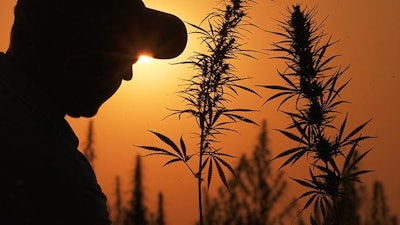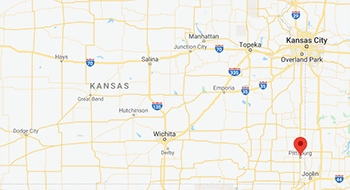
Sunflower Hemp Co. is planning to build a 20,000-square-foot CBD extraction facility in Pittsburg, Kan., according to a recent Morning Sun report. The plan is to refine extracted CBD oil into consumer products.
It’s a big moment for hemp in Kansas. Just last month, the U.S. Department of Agriculture (USDA) approved the state’s regulatory plan for commercial production. Now, it’s up to state officials to go back in and approve that plan as a formal operating procedure for hemp farmers next year. Kansas farmers began growing hemp in earnest just last year, and the state intends to continue working under the auspices of its industrial hemp research program in 2020.
The state is accepting applications for the 2020 season until June 1.
In Pittsburg, the city commission is working with Sunflower Hemp Co. leadership to learn more about how this industry will work and how it can benefit municipalities like this small city of 20,000 in the southeast corner of the state.
 pittsburg kansas
pittsburg kansas“In light of our current economic climate it’s nice that we’re still bringing projects where people are wanting to start new businesses and create new jobs here in Pittsburg and Crawford County,” Director of Economic Development Blake Benson said May 12, according to Jonathan Riley’s reporting from the city commission meeting. The newly legal hemp industry is on one hand an economic engine, a new path forward for American farmers interesting in broadening their agricultural portfolio and finding new ways to navigate a sector in peril. It’s also a potentially disruptive business—one that could rewrite the script on anything from medication to clothing.
Based on conversations happening in Pittsburg (and elsewhere, as the USDA continues to approve new hemp regulations on a state-by-state basis), that much is clear. But there are questions to be asked.
Sunflower Hemp Co. is investing about $1 million into its proposed facility, and owner Colby Terlip is seeking a $110,000 grant to fund the city-mandated fire safety sprinkler system.
The city commission didn’t make a decision on the grant this week, but certainly probed the matter. The underlying issue was a tentativeness on the subject of hemp’s nascent legal status. It’s a new industry, complete with evolving relationships between the business itself and the banking sector and law enforcement. It’s complex on its face. (Kansas does not, for instance, have a state-legal cannabis program in place.)
“I don’t have a problem with it going forward,” Commissioner Larry Fields said, according to Riley’s report. “I think EDAC has been through it, and this is four months old and they’ve seen it; and it’s legal, it’s not illegal.” EDAC is Pittsburg’s Economic Development Advisory Committee.
Much of the conversation with the city commission involved the reiteration that hemp is a legal crop in the U.S. (“Obviously what we’re all talking about is the subject matter,” city manager Daron Hall said. “If Colby was making balloon animals, we probably wouldn’t be having this conversation.”) The relationship between private business and public officials revolves around this education, and Terlip spent time explaining that it’s an increasingly competitive space that requires cooperation from both sides of the private-public split. What level of risk, if any, is the public sphere willing to take on this emerging industry?
“We feel that a lot of players in the game now, their facilities won’t be able to pass those certifications, inspections,” Terlip said. “So that will probably weed some people out when the FDA comes down with what it’s going to take to actually produce a product and put it for human consumption in the retail space.”
Hall pressed Terlip on the U.S. Food and Drug Administration’s ongoing CBD regulation conversations. He asked whether processing CBD oil into edibles products, like gummies, something that Terlip pointed out is not yet permitted under FDA guidance. Another open question.
Last fall, more than 200 hemp growers in Kansas harvested their crops under the first year of the state’s research program. This year, like most U.S. states will see, interest is expected to increase. The back-and-forth conversations between companies like Sunflower and city legislators like those in Pittsburg will become a dominant feature of the early years of hemp in the U.S.
























